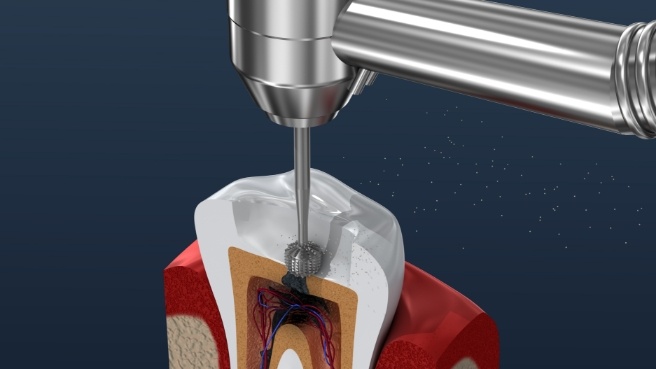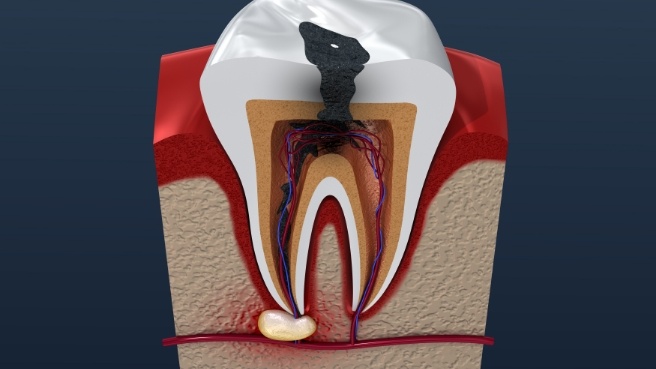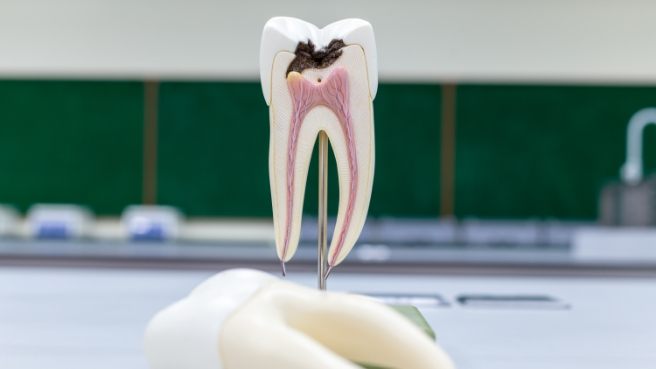Have you been suffering from a severe toothache for several days now? This could be a sign of a severe infection that, if left alone, could eventually lead to worsening health problems and a gap in your smile. Luckily, in many cases, Dr. Rafiq will be able to save your tooth with root canal treatment in Irving. Thanks to advanced techniques, this procedure is simpler and smoother than ever. Contact our dental office right away if you think you might need root canal treatment.
How Does Root Canal Treatment Work?
The tooth contains a soft collection of blood vessels, tissue, and large nerves collectively known as tooth pulp. Many toothaches occur when the pulp becomes badly infected. With root canal treatment, the infected area is removed from the tooth altogether, thus stopping the pain as well as further damage. (The tooth will still be able to function normally even without the nerves in the pulp.)
During the root canal procedure, your trusted dentist in Irving will take an X-ray to check the inside of the tooth and check whether the infection has spread to the surrounding bone. After that, the area around the tooth is numbed, and a rubber dam is placed so that the area stays dry. Dr. Rafiq will make a small hole in the tooth so that he can take out the pulp. The inside of the tooth is cleaned and then resealed. In most cases, you’ll also receive a crown sometime after the procedure since the tooth will be left somewhat fragile.
Why Do I Need Root Canal Treatment?
Pulp usually becomes infected when the tooth has been damaged in some way (whether it’s from a cavity or other kinds of physical trauma) that leaves the inner layers exposed. Eventually, an abscess could form; this is a pus-filled pocket that forms at the roots of the tooth. If left alone, an abscess will lead to:
-
Swelling in the face, neck, or head, making it difficult to breathe in some cases.
-
Bone loss in the jaw.
-
Spreading of the infection to other parts of the body. (In rare cases, you could even develop life-threatening sepsis.)
If the damage is too severe, we may have no choice but to extract the tooth; if that happens, you might need to get a bridge or another kind of dental prosthetic so that you can continue to eat and speak properly. However, root canal treatment can help you avoid these complications.
Benefits of Root Canal Treatment
-
Little to No Discomfort: Despite what many patients might think, modern root canal treatment is typically no more painful than getting a filling. You might feel some discomfort afterward, but pain medication can help you control it.
-
Highly Successful: Root canal treatment has a 95% success rate; in many cases, the rescued tooth will continue to last you for the rest of your life.
-
Natural-Looking Restorations: Thanks to natural-looking fillings and crowns, most onlookers won’t be able to tell you even had a root canal performed in the first place.
Root Canal FAQs
With so many rumors being circulated about root canal treatment, it’s hard to get the facts straight. That’s why we’ve compiled professionally answered questions about this widely misunderstood treatment below, for your convenience and peace of mind.
Are root canals painful?
It’s widely accepted that root canals are painful dental procedures; however, that’s actually not the case. The toothache that usually develops before you need the procedure can be incredibly painful, and root canal therapy itself actually acts to reduce your discomfort instead of causing it. Before the procedure even begins, we’ll apply a local anesthetic to the area, making it completely numb. We also offer sedation dentistry as well, so you can feel relaxed throughout the entire procedure. Ultimately, this procedure helps get rid of pain, not cause it.
What’s the recovery process for root canal treatment like?
The following few days after your root canal procedure, you’ll likely experience some discomfort, but nothing severe. We often recommend over-the-counter pain relievers, such as ibuprofen, to help you feel more comfortable while you recover. We’ll also provide you with some basic post-op tips to help you heal faster. These usually include:
-
Maintain a soft diet.
-
Continue brushing and flossing, taking special care around your treated tooth.
-
Maintain a healthy diet by avoiding consumption of sugary foods whenever possible.
-
Place a cold compress on your cheek to help with the pain.
-
Contact our office if you experience any out-of-the-ordinary symptoms.
What happens during a root canal?
After Dr. Rafiq, your dentist in Irving, numbs the area by injecting the anesthetic, he’ll create a small access area in your tooth so he can reach the infected pulp. Our team will remove this pulp and sanitize the inner chamber of your tooth, making sure no harmful oral bacteria linger. To rebuild the structure of the tooth after it’s cleaned out, we’ll place a substance called gutta percha in the access area. We’ll also craft a customized dental crown to provide your treated tooth with protection, strength, and restored structure so that you can continue using it comfortably.
How can I avoid needing a root canal?
The best way to avoid needing a root canal in Irving is to visit our office every six months for a dental checkup and teeth cleaning. That way, if there is a severe cavity or broken tooth that leaves your pulp vulnerable to oral bacteria, we can treat and protect it before the infection develops. It’s also vital to brush and floss every day at home to prevent tartar and bacteria from accumulating in your mouth.



